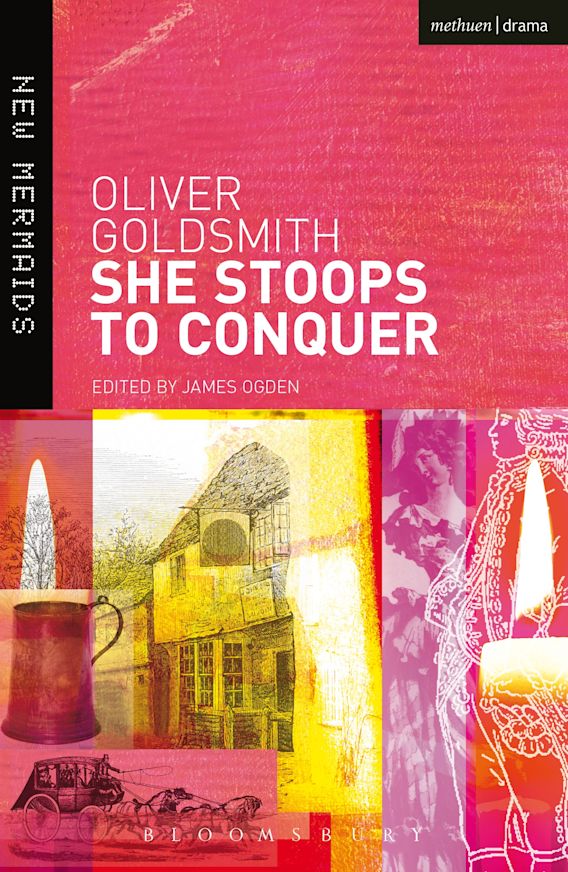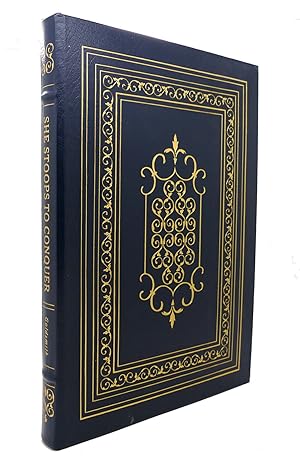

However, beneath the laughter that aroused through such comical devices the playwrights intend to satirize the manners and morality of the Restoration society.

Summary/Abstract: In the 18th century England ‘comedy of manners’ was quite popular as a way of entertainment for every level of the society through its violations of social standards and decorum, the use of stock characters, intrigues, love games and witty dialogues. Published by: Ankara Üniversitesi TÖMER Keywords: Comedy of Manners She Stoops to Conquer Discourse Analysis Conversation Analysis Subject(s): Language studies, Education, Foreign languages learning

GradeSaver, 8 September 2012 Web.A Stylistic Analysis of Oliver Goldsmith’s She Stoops to ConquerĪ Stylistic Analysis of Oliver Goldsmith’s She Stoops to Conquer Author(s): Seçil Varal "She Stoops to Conquer Prologue Summary and Analysis".
SHE STOOPS TO CONQUER BY OLIVER GOLDSMITH HOW TO
But even without such extensive historical research, the prologue brings the audience in with a particular question: can this play remind us that true comedy, which is willing to be silly and unpretentious, is the most entertaining of all? Next Section Act I Summary and Analysis Previous Section Quotes and Analysis Buy Study Guide How To Cite in MLA Format Cedars, S.R. It's worth reviewing the "About 'An Essay on the Theatre'" section of this ClassicNote that explains in more detail the context of the theatre of the time, since it will provide an even more in-depth understanding of the purpose suggested in this prologue. So Goldsmith's play has an extra purpose: it must rejuvenate the joy taken in “laughing comedy,” which could be willing to be more stupid, to dramatize base characters and characteristics, and to mock even the characters who profess to be moral. Woodward suggests that a certain class of actor (and by extension, then, audience and writer) were dying out as sentimental comedy became more popular. The latter, which dated back to the Greeks and Romans and through Shakespeare, was more willing to engage in “low” humor for the sake of mocking vice. At the time of She Stoops to Conquer, popular theatre comedy was separated into what was commonly termed "sentimental comedy" and "laughing comedy." The former was concerned with bourgeois (middle-class) morality and with praising virtue. The prologue mirrors the trend in theatre that writers like Goldsmith were desperately trying to change. However, most relevant is the state of affairs sculpted here. If we, as actors and audience, are in a state of sadness, can the play lift our spirits? Woodward, who would have been portrayed by a different actor – comes out in mourning, already having been crying, which in a way poses a challenge to the play. Obviously, the most explicit purpose is to make the audience laugh. Though not written by Goldsmith, the play's prologue is useful in the way it provides insight into Goldsmith's purpose in the play. He urges the audience to accept the doctor's comic medicine willingly, to laugh heartily, and stresses that should the doctor's goal not be achieved, then they can hold it against him and deny him his fee. He offers one final hope for his problem – "a doctor this night to show his skill," perhaps to make the audience laugh through his five "draughts" of medicine (paralleling the five acts of the play). He attempts to tell a moral poem beginning with "All is gold that glitters," but performs poorly and stops himself. In verse, Woodward laments to the audience that "the Comic muse, long sick, is now a-dying!" As an actor trained in comedy, he intuits that his own career will pass away along with comedy itself, since he "can as soon speak Greek as sentiments!" Unable to tell moralistic, sentimental stories, he fears for the fate of himself and his brethren. Woodward, a celebrated actor of his day and one who had turned down the role of Tony Lumpkin in the play's initial production, is drying his eyes as though he has been crying. Goldsmith might prove the doctor, and She Stoops to Conquer the medicine, that will cease its death.Īt the play's opening, Mr. The basic premise of the prologue is that the comic arts are passing away, and that Dr. The prologue is attributed to David Garrick, Esq., a popular actor of his day.


 0 kommentar(er)
0 kommentar(er)
